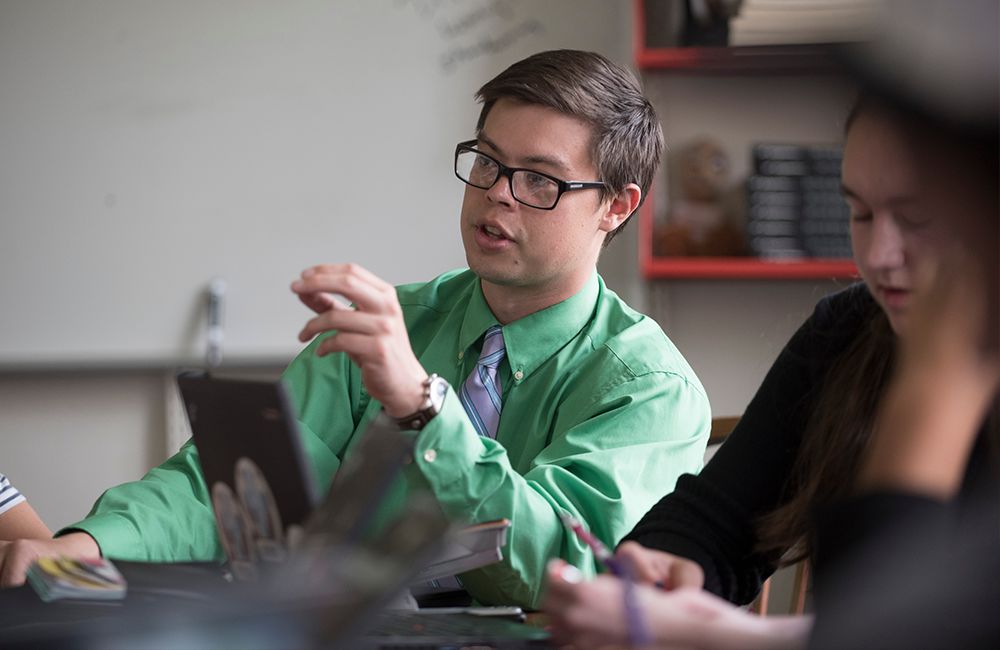Social studies teacher Ryan Oto is also a graduate student. As a central part of his master’s thesis research, he chose to sit down with his own students. Oto has been interviewing exiting seniors at St. Paul Academy and Summit School in order to better understand the history classroom experiences of students with historically marginalized identities.
“It’s a kind of privileged space, where it’s easy for me to make relationships with kids and with adults in the school,” says Oto.
“I want to explore some of the hidden parts of teaching and learning that researchers don’t really have access to when they leave the classroom.”
Leaving his own classroom behind in order to pursue a graduate degree wasn’t an option for Oto, a Carleton College graduate who is in his sixth year teaching. He was concerned that he wouldn’t find a graduate program flexible enough for him to remain a full-time teacher.
“I was worried that there would be sets of courses I had to take, and if I didn’t take them in a certain order everything would fall apart,” says Oto. “But I found that to be the exact opposite.”
Oto began his program in the Department of Curriculum and Instruction as a part-time student in summer 2014 and expects to graduate with a master’s degree in social studies education in August 2016. Already, says Oto, he is seeing what he’s learned in his graduate classes impact his own classroom.
“It’s a way for me to engage in what I love doing at a whole different level,” he says.
Strong bonds
Though Oto knew he wanted to work in a field that helped others, he considered becoming a doctor or a genetics counselor before deciding to pursue a career in education.
“I was drawn to teaching because I took one educational studies class my freshman year,” he says. “I realized how much of a passion I had for thinking about schools, thinking about learning, and thinking about teaching as a whole.”
During his sophomore year, a professor helped foster Oto’s interest in education by giving him the opportunity to teach—helping high school juniors and seniors improve their academic writing skills. Oto knew he was in the right place, he says, because when his alarm would sound at six every morning, he was happy to get out of bed and go to work.
“I knew then that this was going to be something I was in for the long haul,” says Oto.
Oto recalls several teachers who have made a significant impact on his path. One was his high school English teacher, a tall, intimidating-looking man with a buzz cut.
“I remember thinking, ‘I’m terrified of who you are,’” Oto says. But that soon changed.
When a friend on Oto’s high school soccer team broke his leg—a devastating injury to the young athlete—the intimidating English teacher encouraged Oto and his friends to visit their teammate in the hospital instead of attending his class that afternoon. Though it may have seemed like a simple decision to his teacher, it meant the world to Oto as a student and athlete.
“He showed me the importance of the humanity of teaching.”
It’s an experience that sticks with him as he forms relationships with his own students. “It has informed so much of the way I treat people,” he says, “not only in my classrooms but day to day.”
Now Oto coaches hockey and is focused on building strong bonds with his students during class time as well as on the ice.
“I think the best part of it is just getting to see the kids outside of the classroom,” he says.
Identity in the classroom
Oto has noticed that teacher–student connections show up in his research, too. He notices that, all too often, he says, students who are underrepresented in typical social studies curricula feel like they must hide parts of their identity or are afraid to participate at all. That puts a block between the teacher and student that can be hard to work through.
“What I’ve seen so far in my interviews is that kids intentionally check pieces of themselves at the door before they enter the classroom,” says Oto.
“The experiences that they tell me are heartbreaking—that they don’t see themselves reflected in content, that they don’t feel connected.”
In part, the flexibility of the Department of Curriculum and Instruction’s program and his relationships with faculty members have made it possible for Oto to craft his thesis around his dedication to racial equity and his deep care for his own students.
“If you want to make your own work and you want professional academics to support you in that venture … then I really can’t think of many other places than the U where you can do that,” he says.
Oto expects his graduate work will remain influential to the rest of his career, and he hopes it leaves a lasting impact on his students as well.
“You don’t graduate from issues of equity and injustice,” he says.
Learn more about the social studies education program and the Department of Curriculum and Instruction.
Story by Ellen Fee | Photo by Scott Streble | February 2016
 Photo by Scott Streble
Photo by Scott Streble